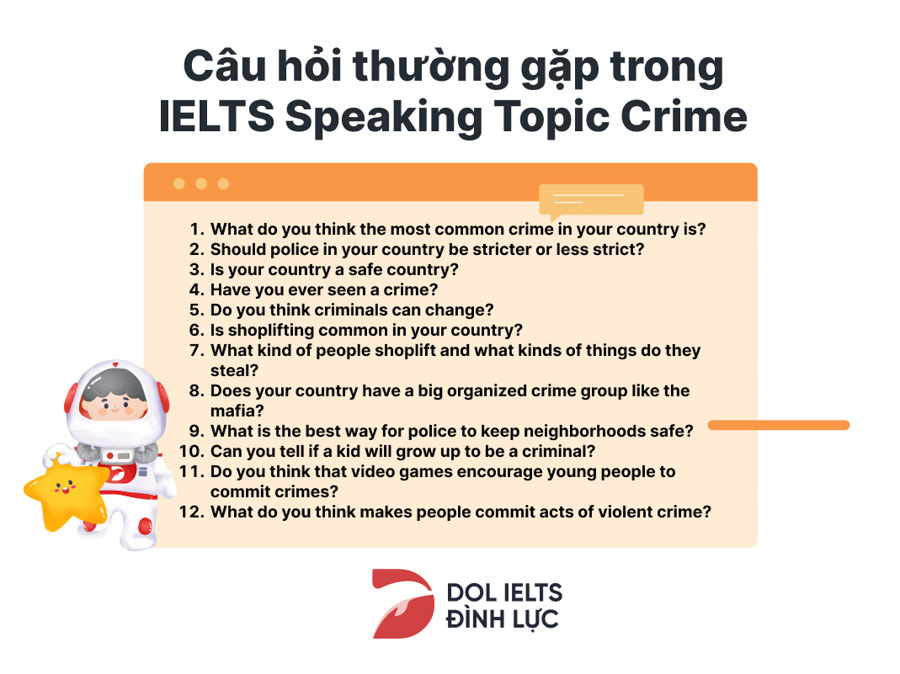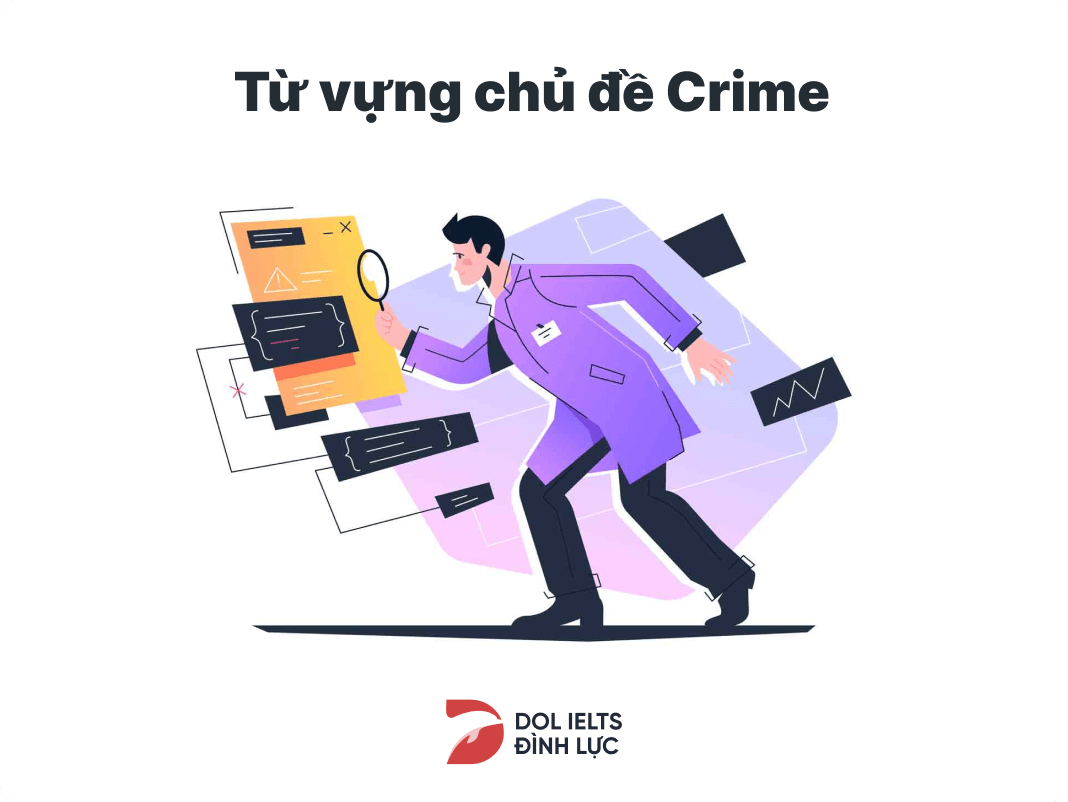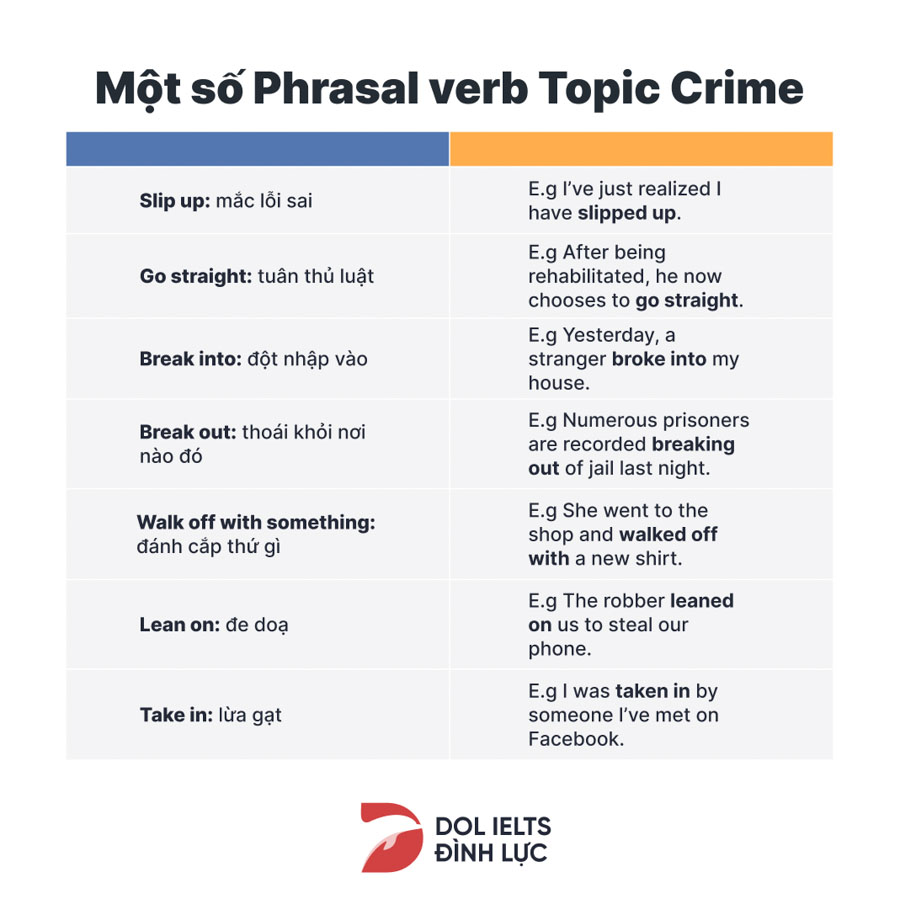IELTS Speaking Crime: 12+ Bài mẫu chủ đề Crime hay nhất
Hãy cùng DOL tham khảo bài viết sau để có thể bổ sung thêm các từ vựng, các cụm động từ hay thuộc chủ đề Crime. Cùng với đó là tìm hiểu thêm về cách thức trả lời các câu hỏi thường gặp thuộc chủ đề này nhé.
DOL IELTS Đình Lực
Nov 04, 2022
2 mins read

Table of content
1. 12 bài mẫu chủ đề crime
2. Từ vựng chủ đề crime
3. Phrasal verb chủ đề crime
Câu hỏi thường gặp:
1. 12 bài mẫu chủ đề crime

1.1 What do you think the most common crime in your country is?
From my point of view, pickpocketing is the most typical ill of society. This is because law enforcers find it hard to identify potential suspects until they literally take action. But when it actually happens, it seems too late. I can’t remember how many times I witnessed people become victims of such illegal behaviors. Not only losing personal items, people sometimes are dragged on the street, leaving them with injuries.
Pickpocketing: nạn móc túi
ill of society: tệ nạn xã hội
law enforcers: cảnh sát, người thi hành luật
potential suspects: nghi phạm tiềm năng
victims: nạn nhân
personal items: vật dụng cá nhân
1.2 Should police in your country be stricter or less strict?
I have to say Vietnamese people are doing a good job, so I mean it’s not about them being too stiff or not stiff enough. We are all humans, so I believe in some circumstances, police officers may handle these at a personal level, and I’m totally fine with it. However, I believe that the legal system should introduce sterner punishments since people seem to be indifferent to the law. In short, the problem is about the regulation, not about the police.
Stiff: nghiêm khắc
at a personal level: ở mức độ cá nhân
legal system: hệ thống pháp luật
sterner punishments: hình phạt nghiêm khắc hơn
indifferent: thờ ơ
1.3 Is your country a safe country?
Obviously yes. Vietnam has a legislative body and citizens are protected under a clear and transparent legal system. I feel lucky as I was born in a country where there is no terror. Unlike other Western countries where residents are allowed to bear arms, Vietnamese inhabitants are prohibited to do so. Therefore, I find it safer to stay here. Besides, law enforcers are assigned to be present on the street to ensure the safety of traffic participants, which is very nice.
transparent: minh bạch
terror: khủng bố
bear arms: mang vũ khí
prohibited: bị cấm
ensure the safety: đảm bảo an toàn
1.4 Have you ever seen a crime?
Yes, I have. One time I saw a young man trying to steal a handbag from a woman who was riding on her motorbike. It was very fast, then people around didn’t know how to react to the situation. She fell to the road and was dragged for almost 10 meters. She actually didn’t lose her bag but her body was full of bruises and scratches. Her head literally hit the road, but thanks to the helmet, she didn’t have any severe injuries.
dragged: bị kéo
bruises and scratches: vết bầm và trầy xước
helmet: mũ bảo hiểm
severe injuries: thương tích nghiêm trọng
1.5 Do you think criminals can change?
Absolutely yes. When a person commits a crime, it doesn’t mean they will certainly recommit. There are many people who are able to turn their lives around after being reformed. I believe no one was born to be a criminal. Their background, living conditions, and environment are factors having profound influences on their behaviors. If an ex-convict is supported, they totally have a chance to become a beneficial member of society.
committed to crime: phạm tội
recommit: tái phạm
turn their lives around: thay đổi cuộc sống của mình
profound influences: ảnh hưởng sâu sắc
ex-convict: người từng phạm tội
1.6 Is shoplifting common in your country?
Yes, it is. Since the emergence of social media, there are numerous times when shop owners use social platforms to warn people about shoplifting. Such owners are very upset as they keep losing items for no reason. However, after checking the security cameras in the shop, they realized that someone pretended to be a real customer and then put a few items in their jackets and walked away without paying anything.
social media: mạng xã hội
shoplifting: trộm trong cửa hàng
security cameras: camera an ninh
pretended: giả vờ
1.7 What kind of people shoplift and what kinds of things do they steal?
I’m not in favor of the idea that there are certain types of people who will do such things. Perhaps people may have a prejudice that poor people are the ones who are in need of money, so they might steal. But I don’t buy that idea at all. It’s primarily about education. Rich people could also be shoplifters if they are not well-educated enough to prevent themselves from being greedy.
prejudice: định kiến
in need of money: cần tiền
well-educated: được giáo dục tốt
greedy: tham lam
1.8 Does your country have a big organized crime group like the mafia?
No, I don’t think so. Vietnam has a strong sense of law enforcement. As a result, no organizations or groups of people can legally operate against the Constitution. Even though social problems are unavoidable in every country, the government won’t let any professional gangster organizations take control over a certain region. Therefore, in Vietnam, mafia and terror are only seen in movies.
strong sense of law enforcement: ý thức thực thi pháp luật mạnh mẽ
Constitution: hiến pháp
professional gangster organizations: tổ chức xã hội đen chuyên nghiệp
take control: kiểm soát
1.9 What is the best way for police to keep neighborhoods safe?
Well, one of the most optimal ways to ensure the safety of a neighborhood is the presence of law enforcers. If there are patrols at certain times during the day, I’m sure lawbreakers are less likely to be involved in crime. Most crimes happen in deserted areas where there is no supervision from the police officer. That’s why I believe allotting fixed figures of authority can keep neighborhoods safe.
optimal: tối ưu
presence: sự hiện diện
lawbreakers: người phạm luật
deserted areas: khu vực hoang vắng
supervision: sự giám sát
allotting: phân bổ
figures of authority: người có thẩm quyền
1.10 Can you tell if a kid will grow up to be a criminal?
No, it is absurd to say if a kid will become an offender or not. Although it is true that people from criminal families tend to commit crimes in their later life, there are many people from wealthy families who eventually turn out to be criminals. It’s undeniable that the environment plays a crucial role in forming a person’s personality. However, education would be the key that shapes people’s mind and determine who they are
absurd: ngớ ngẩn
offender: người phạm luật
wealthy families: gia đình giàu có
shapes people’s mind: định hình tâm trí
determine: xác định
1.11 Do you think that video games encourage young people to commit crimes?
Yes, I do think so. Since nowadays video games tend to contain violent and sexual content. Being exposed to such images on a regular basis may form a violent tendency in young people, leading to committing acts of crime. However, we cannot blame everything on this form of entertainment. Education and attention from parents are the main keys to raising a well-behaved person.
violent and sexual content: nội dung bạo lực và gợi dục
Being exposed to: tiếp xúc với
violent tendency: khuynh hướng bạo lực
committing acts of crime: phạm tội
blame: đổ lỗi
well-behaved: hành xử đàng hoàng
1.12 What do you think makes people commit acts of violent crime?
Well, there are a variety of incentives. One could be that people are in shortage of money. As a result, they may steal something for people to meet their basic needs in life. Another reason is the infinite greed of some people. They are too lazy to work but want to live a luxurious and glamorous lifestyle, which leads to them involving in illegal acts. Last but not least, there are cases where people have a personal hatred for each other. Therefore, serious crime may result from such revenge and retaliation.
incentives: động cơ
in shortage of money: thiếu tiền
meet their basic needs: đáp ứng nhu cầu cơ bản
infinite greed: lòng tham vô hạn
luxurious and glamorous lifestyle: lối sống xa hoa và sang trọng
illegal acts: hành động bất hợp pháp
personal hatred: thù hận cá nhân
revenge and retaliation: báo thù và trả đũa
Cần làm gì khi không có ý tưởng về một chủ đề nào đó? Đó có vẻ là vấn đề của nhiều thí sinh. Hãy nhớ không phải tất cả các câu trả lời đều phải là ý kiến hoặc quan điểm của riêng bạn. Điều quan trọng là bạn phải tiếp tục. Sử dụng các cuộc trò chuyện của cha mẹ bạn và tin tức truyền hình để mở rộng kiến thức chung của bạn về chủ đề cần nói.
IELTS Examiner’s Tips An Academic Guide to IELTS Speaking and Writing (by Karolina Achirri)
2. Từ vựng chủ đề crime

Crime (n): việc phạm tội
Violent (a): bạo lực
Murder (n): giết người
Kidnapping (n): bắt cóc
Arson (n): phóng hoả
Smuggling (n): buôn lậu
Blackmail (n) tống tiền
Petty crime (n): tội vặt
Shoplifting (n): ăn cắp đồ trong cửa hàng
Pickpocketing (n): móc túi
Trespassing (n): xâm nhập, xâm lấn
Robbery (n): ăn cướp
Theft (n): ăn trộm
Burglary (n): nạn trộm (trong nhà)
Fraud (n): lừa đảo
Criminal (n): tội phạm
Punishment (n): hình phạt
Deterrent (n): sự ngăn cản
Victim (n): nạn nhân
Crime rate (n): tỉ lệ tội phạm
Commit a crime (v): phạm tội
Cybercrime (n): phạm tội trên mạng
Go to jail (v): đi tù
Security (n) an ninh
Serve a prison sentence (v): lĩnh án
Fingerprint (n): vân tay
Investigate (v): điều tra
Suspect (n): nghi phạm
Face recognition (n): sự nhận diện khuôn mặt
Arrest (v): bắt
3. Phrasal verb chủ đề crime

Slip up: mắc lỗi sai
E.g I’ve just realized I have slipped up.
Go straight: tuân thủ luật
E.g After being rehabilitated, he now chooses to go straight.
Break into: đột nhập vào
E.g Yesterday, a stranger broke into my house.
Break out: thoái khỏi nơi nào đó
E.g Numerous prisoners are recorded breaking out of jail last night.
Walk off with something: đánh cắp thứ gì
E.g She went to the shop and walked off with a new shirt.
Lean on: đe doạ
E.g The robber leaned on us to steal our phone.
Take in: lừa gạt
E.g I was taken in by someone I’ve met on Facebook.
Let off (with something): thả, phóng thích
E.g Since he is under 17, she was let off with a suspended sentence.
Câu hỏi thường gặp:
Gợi ý trả lời IELTS speaking: Tội phạm là gì?
Tội phạm là một hành vi bất hợp pháp mà một người nào đó có thể bị trừng phạt về mặt pháp lý, chẳng hạn như làm hư hỏng tài sản của ai đó. Bạn có thể dùng: A crime is an illegal act that someone can be legally punished for, like damaging someone's property.
Từ vựng cho IELTS speaking: Tội phạm nào là phổ biến nhất?
Bạn có thể dùng cụm từ: Violent Crime (Tội phạm bạo lực), Property crime (Tội phạm tài sản)
Từ vựng cho IELTS speaking: Nguyên nhân tạo nên tội phạm?
Bạn có thể dùng cụm từ: Poverty (Nghèo đói), parental neglect (Sự bỏ rơi của cha mẹ), low self-esteem (Lòng tự trọng thấp), alcohol and drug abuse (Lạm dụng rượu và ma tuý)
Từ vựng cho IELTS speaking: Ngược lại với tội phạm là gì?
Thí sinh có thể sử dụng các từ sau: Virtue (Đức hạnh); Righteousness (Chính nghĩa); Integrity (Sự toàn vẹn); Honesty (Trung thực); Uprightness (Ngay thẳng); Decency (Đứng đắn); Virtuousness (Đức hạnh); Morality (Đạo đức); Goodness (Lòng tốt); Truthfulness (Sự trung thực, sự thật).
Bài viết trên là tổng hợp các kiến thức bổ trợ cho phần thi IELTS Speaking Crime. DOL hy vọng rằng với những kiến thức bổ ích này, các bạn sẽ có sự chuẩn bị tốt hơn cho kỳ thi sắp tới.
Table of content
1. 12 bài mẫu chủ đề crime
2. Từ vựng chủ đề crime
3. Phrasal verb chủ đề crime
Câu hỏi thường gặp:
